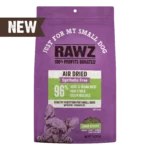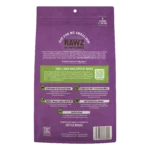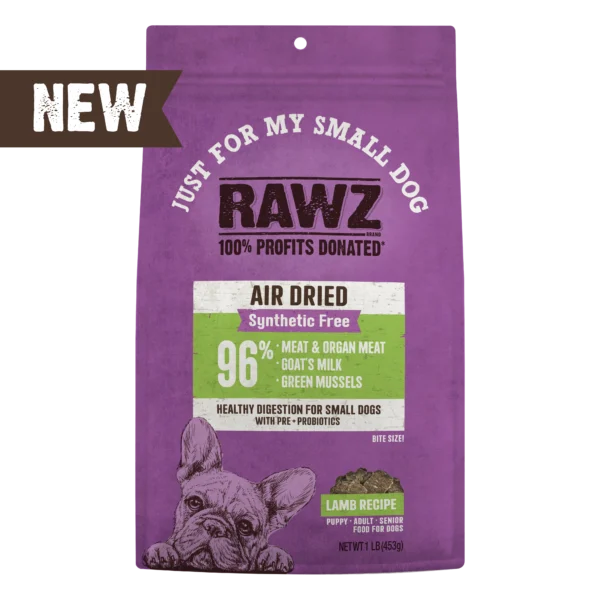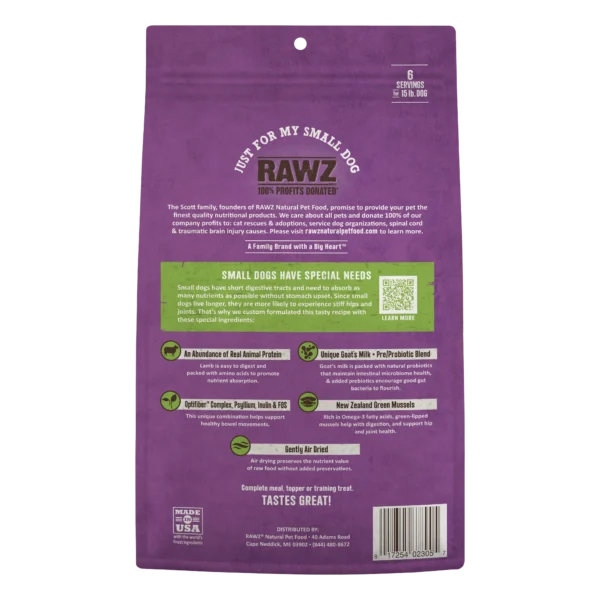BECAUSE SMALL DOGS HAVE SPECIAL NEEDS.
- Smaller dogs have short digestive tracts. So they need to absorb as many nutrients as possible without stomach upset.
- Since smaller dogs tend to live longer than larger breeds, they’re more likely to experience stiff hips and joints.
INGREDIENTS:
LambLamb is one of the best and most nutritious meats for dogs, which is why it is often recommended to pet owners by veterinarians. Lamb is an excellent source of protein, providing the essential amino acids dogs need to stay healthy and active. One of the biggest benefits of feeding lamb to your dog is that it is a good source of zinc, a mineral that affects many fundamental processes, including that of immune functioning. Zinc also helps dogs stabilize their blood sugar levels and their body’s metabolic rate., WhitefishWhitefish is an excellent source of protein, minerals (calcium, phosphorus and potassium), vitamins, and omega fatty acids that help skin, coat, growth and development., Sweet PotatoSweet potatoes are a nutrient-rich source of vitamins and minerals, such as vitamin A, which is essential for the support of vision, immune function, and skin health., Lamb LiverLamb liver is an excellent source of high-quality protein. Not only do pets love the flavor, liver is known to be one of the most concentrated sources of natural vitamin A of any food. Liver is also a great source of folic acid and all of the B vitamins (particularly vitamin B12), which help with fatigue, mental ability and nerve health, as well as preventing anemia. Liver also contains one of the best sources of iron. The primary function of iron is oxygen transport and cell respiration. Iron is also necessary for many functions in the body including formation of hemoglobin, brain development and function, regulation of body temperature, muscle activity and metabolism. The iron in liver is one of the most easily digestible and usable sources of iron. Lamb liver is particularly abundant in phosphorus, copper, iron and zinc., SalmonOur salmon is an excellent source of protein, minerals, vitamins and omega-3 fatty acids. Proteins are the building blocks of organ tissues and cells. Amino acids contained in protein are responsible for many processes in the body, including maintenance of smooth workflow and digestion. Amino acids also help to regulate hormones, build muscles, fix tissue in tendons, ligaments, cartilages, and maintain healthy skin, coat, and nails., Goat's MilkGoat’s milk is a source of essential nutrients such as calcium, protein, and vitamins. Its low lactose levels make it an easily digestible ingredient for your pet., New Zealand Green MusselsAids in reducing joint pain; natural anti-inflammatory; contains omega-3 fatty acids (DHA and EPA) which aids in reducing inflammation; contains zinc and magnesium which aid in joint metabolism., Sunflower LecithinSunflower lecithin is a natural source of choline and phospholipids, nutrients that help support cognitive function, aid digestion, and promote a healthy skin and coat., Natural FlavorA flavor enhancer derived from natural sources in place of rendered fats. It is both vegan based and gmo-free., Sunflower Oil (Preserved with Mixed Tocopherols)Sunflower oil contains a high level of linoleic acid produced by expressing the oils of sunflower seeds. Sunflower oil is low in saturated fat, which makes it a better choice than oils and fats that are high in saturated fat. Sunflower oil is used to provide essential fatty acids. Essential fatty acids (EFAs) are fats that must be supplied in the diet because the body cannot produce them. They are required for normal growth and functioning of the cells, muscles, nerves, and organs and the production of prostaglandins. Deficiencies of EFAs are linked to a variety of health problems, including heart disease, cancer and diabetes., Chicory Root (Source of Inulin)Chicory root is naturally high in inulin, a soluble fiber that acts as a prebiotic to help nourish beneficial gut bacteria., Beef BoneBeef Bone, Sea SaltSea salt provides sodium along with trace minerals such as magnesium and potassium. Sodium is an essential nutrient for fluid balance and normal cell function., Psyllium HuskPsyllium husk is a soluble fiber that absorbs water in the digestive tract, helping support normal stool consistency., FructooligosaccharidesFOS are soluble prebiotic fibers found in fruits and vegetables that selectively promote the growth of beneficial gut bacteria., Dried KelpKelp contains over 60 minerals and elements, 21 amino acids and simple and complex carbohydrates. These nutrients provide excellent support of the glands, especially the pituitary, adrenal and thyroid glands. Kelp supplies a natural source of iodine, which also plays a very important role in the normal functioning of the thyroid gland., Marine Microalgae Oil (Algal Oil)Marine microalgae oil is a sustainable alternative to fish oil and a highly-concentrated source of omega-3 fatty acids, eicosapentaenoic (EPA) and docosahexaenoic acid (DHA), CarrotKnown for their beta-carotene content for eye health, carrots are also rich in vitamin A and soluble fiber, which can help maintain a regular digestive system., AppleA healthy, low-calorie, high-fiber fruit that's rich in vitamin C, small amounts of potassium, and dietary fiber, along with polyphenol antioxidants.. Apples are beneficial for immune health and digestion as well as skin & coat., TomatoTomatoes offer a spectrum of benefits, such as high fiber for digestion, rich in vitamin C and potassium, and supplies carotenoids such as lycopene and beta-carotene (vitamin A precursor)., ShiitakeContributes B vitamins (especially B2 and B5), selenium, copper, and small amounts of vitamin D₂ when sun-dried., BroccoliA source of vitamin C, vitamin K, folate, potassium, and fiber, along with carotenoids and other antioxidants., OrangeHigh in vitamin C and provides potassium, folate, and small amounts of calcium and magnesium., CranberryCranberries provide an excellent source of antioxidants, protecting cells from oxidative damage., PumpkinThe soluble fiber in pumpkin flesh slows digestion and can help manage sensitive digestive systems that are prone to upset stomachs. Pumpkin is also rich in potassium, Vitamin C and carotenoids, such as beta-carotene, SpinachSpinach is known for its iron-rich properties. Iron is necessary for metabolizing proteins, as well as the production of hemoglobin and red blood cells. Spinach is also a good source of fiber, calcium, potassium and vitamins A, B6 and K. Rich in chlorophyll and carotene, it is a great source of antioxidants., BeetSupplies folate, manganese, potassium, and dietary fiber, along with betalain pigments with antioxidant properties., Tart CherryProvides vitamin C, potassium, and polyphenolic compounds (including anthocyanins)., StrawberryRich in vitamin C and manganese, with dietary fiber, folate, and antioxidant polyphenols., BlueberryProvides vitamin C, vitamin K, manganese, and dietary fiber, as well as anthocyanins with antioxidant activity., EggGood source of highly digestible protein (~100% digestible); naturally rich source of selenium, vitamin D, B6, B12 and minerals such as zinc, iron and copper, Flaxseed MealFlaxseed is an ancient food that has been recognized for its health benefits for thousands of years. Essential fatty acids (EFAs) are polyunsaturated fats (also known as “good fats”) and are what make flaxseeds so beneficial. The body can’t produce EFAs itself – they must be obtained through diet. They are required for normal growth and functioning of the cells, muscles, nerves, and organs. Deficiencies of EFAs have been linked to a variety of health problems, including heart disease, cancer and diabetes. Flaxseed also contains lignans – chemical compounds found in some plants. Research has shown a lowered risk of cancer associated with diets rich in lignans. Other studies suggest flaxseed lignans can lower cholesterol and help to prevent diabetes. As a high-fiber food, flaxseed is also great for intestinal health., Chia SeedChia seeds contain soluble and insoluble fiber, plant-based omega-3 fatty acids (ALA), and natural antioxidants., Fenugreek SeedFenugreek is one of the oldest cultivated medicinal plants native to southern Europe and Asia. The fenugreek seeds act as a binder, which replace inexpensive commercial gum binders. They are naturally rich in many vitamins and minerals. They contain polysaccharides, which lower bad cholesterol and simultaneously bind to toxins to be expressed by the body. Fenugreek seeds contain an amino acid that lowers glucose absorption, which lowers blood sugar, making them a recommended food ingredient for diabetic diets. They are also an excellent source of fiber, which aids in digestion. Fenugreek seeds also contain many powerful phytonutrients, which aid in multiple digestive and neurological functions., Dandelion GreensDandelion greens are an excellent source of essential vitamins A, C, K, D, and B complex and are also a source of minerals such as iron, manganese, and potassium. Dandelion greens have been used to supports healthy liver, act as a mild diuretic, and are thought to be an anti-inflammatory agent as well., Mixed Tocopherols (Preservative)A natural antioxidant and vitamin E source that is used to slow the oxidation process of fats and oils in order to maintain freshness., Rosemary ExtractA natural preservative and flavoring agent., Dried Bacillus Coagulans Fermentation ProductA source of live, beneficial microorganisms (probiotics) that can help maintain a balanced intestinal microbiome.
PROTEIN MIN: 29.00% | FAT MIN: 16.00% | FIBER MAX: 5.00%
MOISTURE MAX: 18.00%
OMEGA 3: 1.47% or 14,700 mg/kg | OMEGA 6: 1.31% or 13,100 mg/kg
DHA: 0.57% | EPA: 0.02%
TOTAL MICROORGANISMS (Bacillus Coagulans):* min 20,000,000 CFU/lb
*Not recognized as an essential nutrient by the AAFCO Dog Food Nutrient Profiles.
CALORIE CONTENT (calculated): ME = 3,690 kcal/kg, 361 kcal/cup.
RAWZ® Air Dried Lamb Recipe is formulated to meet the nutritional levels established by the AAFCO Dog Food Nutrient Profiles for All Life Stages excluding growth of large size dogs.
Adjust the amount of food you serve based on the age, size and activity level of your dog. Promptly refrigerate the unused portion. Fresh water should be available at all times.
ADULT DOG FEEDING GUIDELINES FOR MAINTENANCE
| WEIGHT (IN LBS.) |
CUPS (PER DAY) |
| <5 |
1/2 |
| 5-10 |
1/2 – 3/4 |
| 10-15 |
3/4 – 1 |
| 15-20 |
1 – 1 1/4 |
| 20-25 |
1 1/4 – 1 1/2 |
| 25-30 |
1 1/2 – 1 3/4 |
FEEDING PUPPIES: Feed up to twice the adult amount per day.
GESTATION/LACTATION: Feed up to six times the adult amount per day depending on the litter size.





